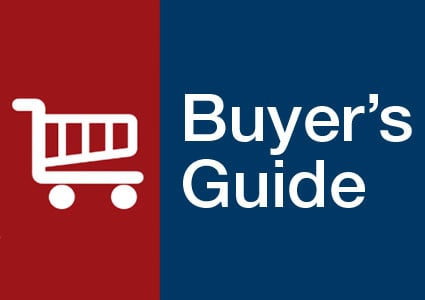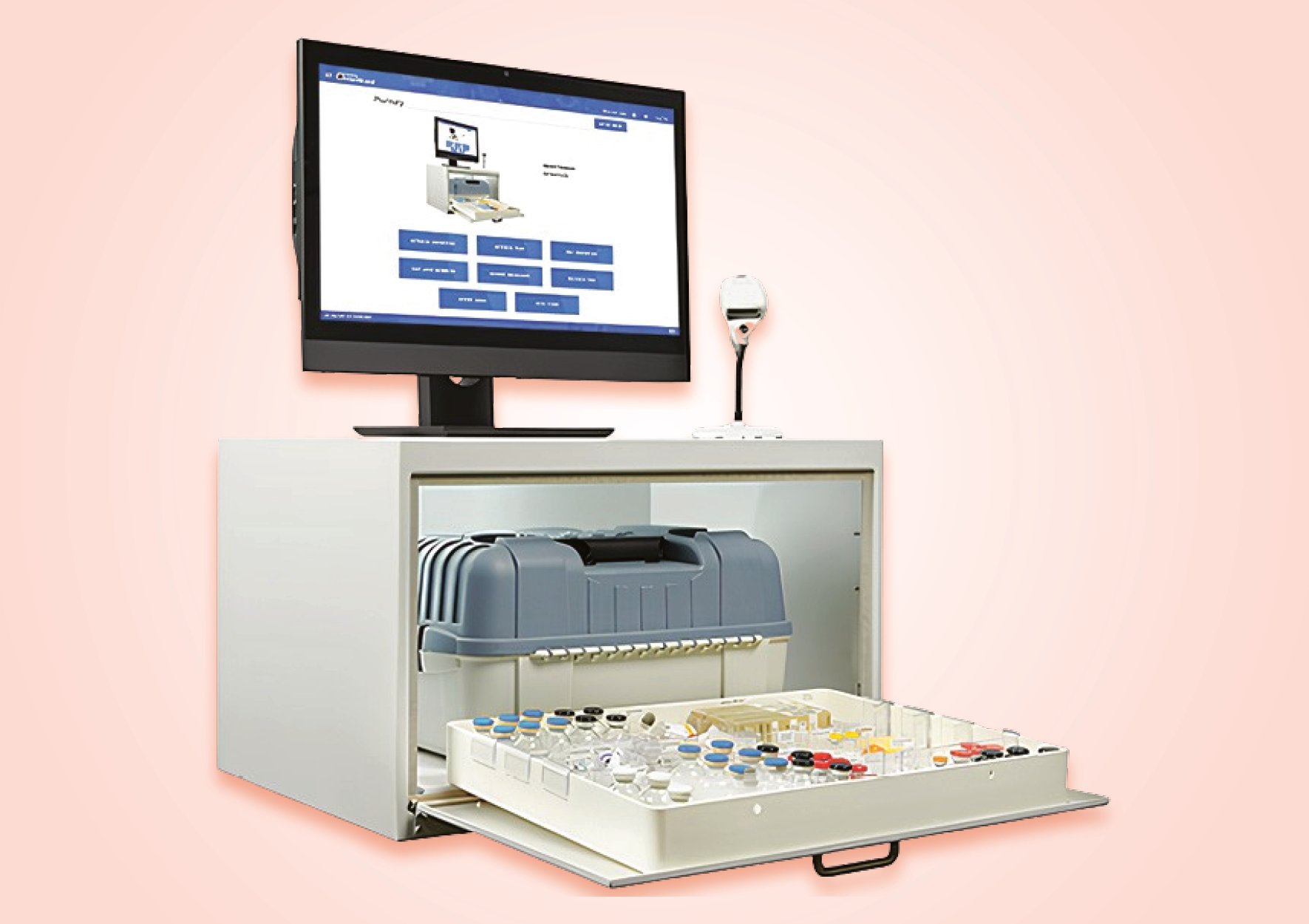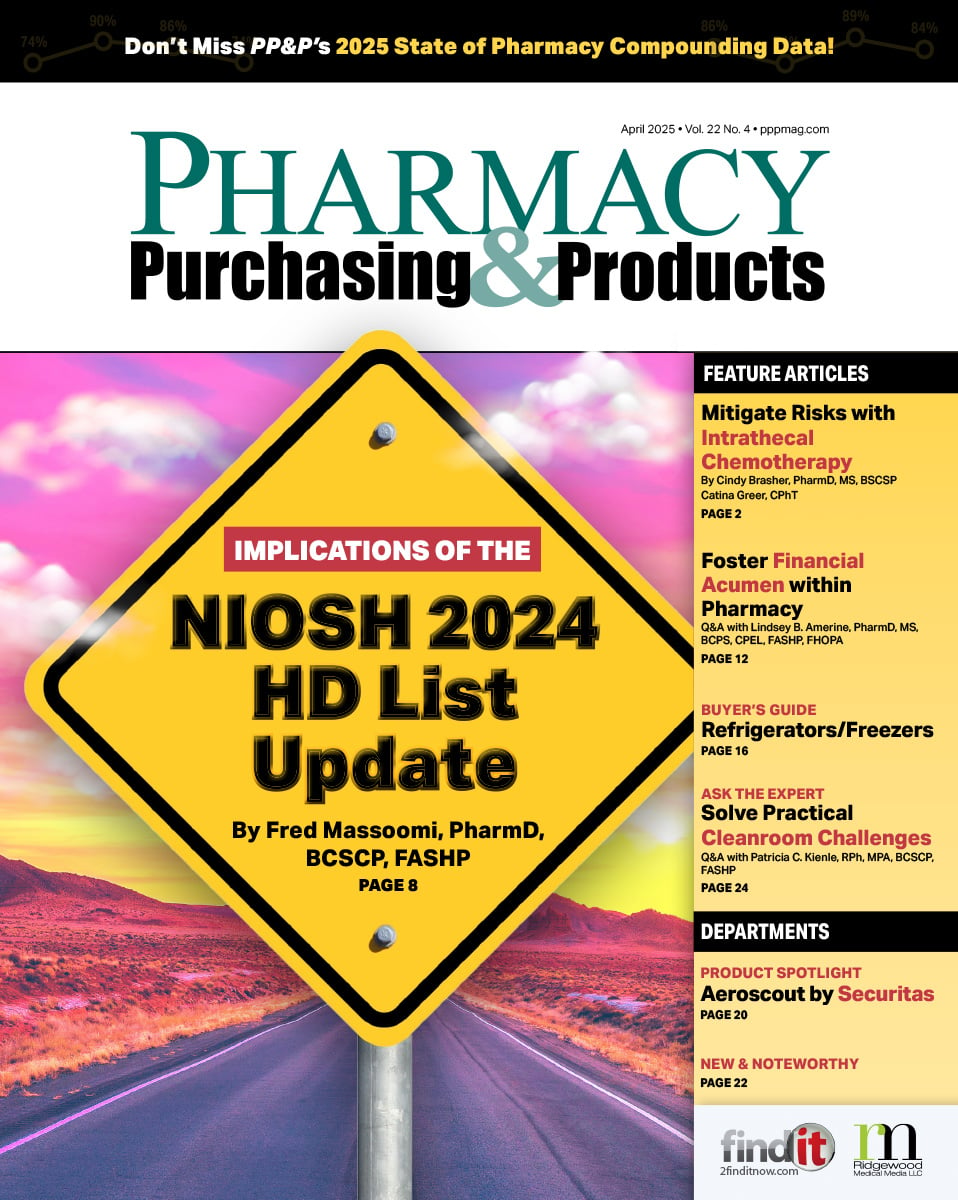- Show Menu
- Contact Us
- FAQs
- Reader Service
- Survey Data
- Survey Winners
- Testimonials
- Upcoming Events
- Webinars
- White Papers
The Joint Commission's Medication Compounding Certification Program
Q&A with Robert Campbell, PharmD, Joint Commission Surveyor, Hospital Accreditation Program; Reviewer, Medication Certification Program
Pharmacy Purchasing & Products: What are the purpose and goals of The Joint Commission’s Medication Compounding Certification Program?
Robert Campbell: The compounding certification program was developed to assist compounding pharmacies in achieving optimal safety, quality, and reliability in their compounding practices. It is designed to assist organizations in improving compliance activities and provides an external validation of a facility’s compliance to leading compounding practices.
Perhaps most importantly, the program assists facilities in identifying unrecognized vulnerabilities. Identifying areas of risk that organizations may be unaware of is perhaps one of the most valuable ways to improve patient safety. It is common for pharmacies to take an approach to improving areas of practice with known risk with the goal of protecting patients. Maintaining close familiarity with process can also result in the organization not recognizing other areas of vulnerability in their compounding process. The Joint Commission Medication Compounding Certification Program’s standards provide a measurement against which organizations can judge their practice and identify areas requiring improvement.
The program covers USP General Chapter <795> Pharmaceutical Compounding—Nonsterile Preparations, General Chapter USP <797> Pharmaceutical Compounding—Sterile Preparations, and will cover USP <800> Hazardous Drugs—Handling in Healthcare Settings after it goes into effect on July 1, 2018.
PP&P: Who is eligible to receive compounding certification?
Campbell: The Joint Commission Medication Compounding Certification is a voluntary certification program available to any hospitals and home care agencies that conduct compounding and would like an independent evaluation and certification of their compliance with USP <795> and <797>. Certification is not offered for outsourcing pharmacies. This certification is unique in that organizations need not be Joint Commission-accredited in order to seek compounding certification; all other Joint Commission certifications require accreditation.
Any organization can seek certification, although most that do so are progressing on their path to compliance. Nonetheless, organizations in the early stages of compliance are still encouraged to seek certification, provided they have the necessary infrastructure in place to be evaluated for compliance.
The Michigan Compounding Pharmacy Law of 2014 requires that licensed pharmacies performing compounding services for sterile pharmaceuticals must obtain accreditation. In response, the Michigan Board of Pharmacy approved The Joint Commission medication compounding certification as one of the eligible certifying bodies. The board requires all eligible pharmacies to complete a certification process by June 30, 2017. Because Michigan was the first state to require external compounding certification as part of their licensure, the program was rolled out in Michigan first. When the Michigan State Board of Pharmacy established this requirement, it was aware that The Joint Commission had just developed a program, and approved our program as one of the compounding certification vendors. More than 80 organizations are expected to seek compounding certification through The Joint Commission program in Michigan by the deadline.
PP&P: What process did The Joint Commission follow to develop the compounding certification program?
Campbell: After extensive research and comprehensive literature reviews related to compounding, as well as strategic leadership meetings with internal and external stakeholders, The Joint Commission developed a technical advisory panel comprising hospitals and home care organizations, to ensure a breadth of voices were represented in the development of the program. The panel includes broad representation from a variety of facility types, including critical access hospitals, community hospitals, teaching facilities, and home care organizations. This group, as well as internal staff at The Joint Commission, worked closely with USP and the FDA to develop standards for the program. We visited facilities and reviewed the standards with these organizations in order to investigate their applicability in real world settings. After fine-tuning the program based on feedback from these visits, we went live with the program in Michigan.
The program focuses on three main areas: People, Product, and Environment.
- People: Includes the training and competency of compounding staff, proper use of personal protective equipment (PPE), and aseptic technique. The Joint Commission wants to ensure that compounding staff is sufficiently competent to execute the risk level of compounding performed. There is a strong focus on reviewing workflows and documentation practices, as well as ensuring that aseptic technique is followed when items are brought into the hoods, out of the buffer areas, etc.
- Product: Addresses base product sterility, correct labeling, pharmacist review of finished product, and compliance with beyond-use dates (BUDs), including whether BUD is determined correctly. Further, the Joint Commission reviews how products are stored after compounding but prior to patient administration, and examines return processes.
- Environment: Encompasses a USP and Joint Commission-compliant compounding complex: hoods, cabinets, and isolators utilize appropriate airflow; medications are stored correctly; appropriate documentation is available; and policies and procedures (P&Ps) are in place. For example, if environmental services staff or non-pharmacy staff perform cleaning services, do they receive proper training? Is ongoing training provided when new products or technologies are added to the compounding process? Are products stored correctly so they can be returned, if necessary?
Moreover, The Joint Commission evaluates an organization’s general responsibilities and expectations for hospital and pharmacy leadership to ensure best practices are followed. For example, we want to ensure that adequate resources are available to ensure safe compounding practices.
PP&P: How should an organization prepare to seek Joint Commission compounding certification?
Campbell: Organizations should have P&Ps in place guiding the following: cleaning the compounding complex, including the anteroom, buffer room, and the primary engineering controls; staff training and education, including ongoing training as well as training upon hire; workflow from product receipt through compounding and administration; BUD assignment protocols; and maintenance and monitoring of primary and secondary engineering controls.
The first step is to obtain a copy of the standards from The Joint Commission Web site, available at: http://pages.jointcommission.org/Medication-Compounding-E-dition-Trial_MDC-Edition-Request-Form---Johnson.html. If an organization is Joint Commission-accredited, the application and review processes will be familiar. Questions should be directed to business development staff at The Joint Commission central office; hospital-based pharmacies can contact Brian Johnson at bjohnson@jointcommission.org.
After reviewing the standards, organizations should conduct a gap analysis to determine which areas require attention prior to The Joint Commission’s initial review. Once any areas of weakness are addressed, an organization should complete an application for certification. The initial onsite validation visit is typically scheduled 4 to 5 months from the time the application is accepted. Initial reviews are scheduled, as are all surveys. A field reviewer will visit the facility for the number of day(s) appropriate to the organization’s size and complexity. Once the review is completed, the organization will receive a report outlining requirements for improvement from The Joint Commission. Thereafter, the organization has 60 days to submit evidence of standards compliance, which requires communication of how the noted compounding challenges will be corrected, who will correct these issues, and when they will be completed. Once the evidence of standards compliance is successfully submitted and accepted, the organization will receive its certification, which is good for 2 years. A recertification visit will occur 2 years after the initial visit.
The Joint Commission’s QualityCheck Web site lists all organizations that have received compounding certification (available at www.qualitycheck.org/).
PP&P: How does this program benefit those facilities seeking certification?
Campbell: Pharmacists may wonder, Why would I want to put my hospital through another Joint Commission survey? The most significant benefit of obtaining compounding certification is that the process increases the collaboration between organizations and The Joint Commission reviewers, who bring a special knowledge set; this collaboration enables celebration of success and highlights constructive ways of remedying challenges. Improving practice is contingent on taking an honest look at those areas in which organizations excel as well as those areas that are challenging.
Additional benefits of seeking Joint Commission compounding certification include:
- External Validation of Workflow Practices. An independent review of compounding practices is an excellent way to identify areas of vulnerability. As discussed earlier, it is not uncommon for organizations to become blinded by familiarity to areas that require remediation. Joint Commission collaboration provides an independent, third-party review of your compounding practices in order to identify any areas of vulnerability.
- Surveys Are Performed by Specially Trained Pharmacists. All compounding surveys are performed by pharmacists who have received special training; in addition, all reports are prepared by these same specially trained pharmacists. Organizations seeking certification can be certain that surveyors are familiar with pharmacy processes and understand real-world compounding challenges.
- Increased Organizational Awareness of Compounding Expectations. The expectations for sterile and non-sterile compounding are complex and may involve significant capital investment. Having a respected external validator come in, such as The Joint Commission, can help generate buy-in from administration to approve funding requests for necessary investments.
In addition, seeking certification allows organizations to access Joint Commission resources, such as best practices. In the post-survey period, The Joint Commission shares resources to enable timely resolution of any weaknesses in the compounding process.
So while there can certainly be some anxiety when The Joint Commission is in a facility, keep in mind that we are there to help identify risks across the enterprise and help strategize ways to mitigate those risks so organizations can continue to provide patients with outstanding care.
PP&P: What additional resources does The Joint Commission offer?
Campbell: The following resources are available:
- Eligibility and complimentary 90-day access to the standards for medication compounding certification are available on The Joint Commission Web site at www.jointcommission.org/certification/mdccert.aspx and in the Medication Compounding Certification Manual, available only online.
- The program Web site includes a list of states that require compliance with USP General Chapters <795> and <797> (available at www.jointcommission.org/assets/1/6/Feb_2017_State_Compounding_Regulations.pdf).
- The Joint Commission provides Webinars on an ongoing basis; these are available on the Web site at https://www.jointcommission.org/certification/mdccert.aspx.
- Answers to frequently asked questions are available at www.jointcommission.org/assets/1/6/MDC_Cert_FAQ_021617.pdf.
A future goal for the compounding certification program is to provide organizations with a leading practice library, which will contain leading practice documents from organizations around the country to share best practices to as many organizations as possible. As surveyors travel throughout the country to certify compounders, they plan to request that organizations with excellent practices submit their P&Ps to The Joint Commission Central Office; a compilation of these practices will then reside in the leading practice library for all to use. We envision that supporting a sharing environment will improve overall pharmacy practice.
Questions should be directed to business development staff at The Joint Commission central office; hospital-based pharmacies can contact Brian Johnson at bjohnson@jointcommission.org, home care pharmacies can contact Cynthia Cook at ccook@jointcommission.org.

Robert Campbell, PharmD, is a Joint Commission Surveyor in the Hospital Accreditation Program and a reviewer for the Medication Certification Program. He received his PharmD from Florida A&M University College of Pharmacy.
Like what you've read? Please log in or create a free account to enjoy more of what www.pppmag.com has to offer.








